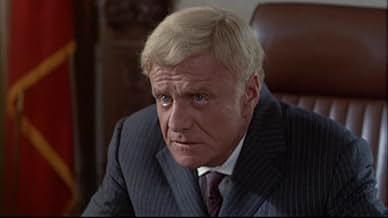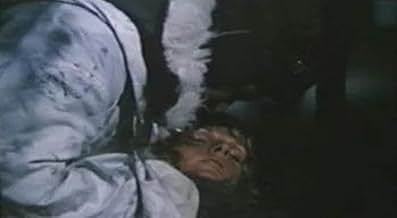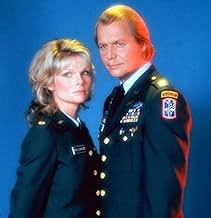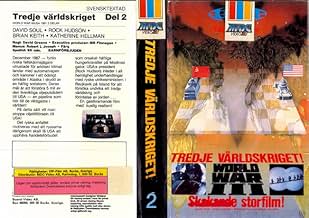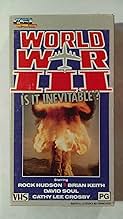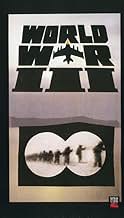Soviet forces attack Alaska's pipeline during a US grain embargo in 1987. Col. Caffey's Guard unit faces them at a pump station as Soviet and US leaders engage in strategic tension, risking ... Read allSoviet forces attack Alaska's pipeline during a US grain embargo in 1987. Col. Caffey's Guard unit faces them at a pump station as Soviet and US leaders engage in strategic tension, risking WWIII.Soviet forces attack Alaska's pipeline during a US grain embargo in 1987. Col. Caffey's Guard unit faces them at a pump station as Soviet and US leaders engage in strategic tension, risking WWIII.
- Won 1 Primetime Emmy
- 1 win & 1 nomination total
Browse episodes
Featured reviews
WW III is a film about political brinksmanship in the face of nuclear war and a thriller about battling against overwhelming odds. The film is about a President who relies on a national guard unit low on ammo to battle russians sent into alaska to destroy the alaska pipeline. The russian premier also relies on his men in alaska as political bargaining chips as well. The film goes from political bargaining to gun battles in the arctic snow of alaska. WW 3 also deals with infighting within the soviet union as the two super powers hurtle towards a nuclear exchange. This film marks one of Rock Hudsons better film roles.
Great made for TV miniseries from NBC. I vividly recall this movie from when I was in maybe the 10th grade and being absolutely riveted by it's superbly plotted story about a group of National Guard soldiers trying to fend off a Russian invasion of Alaska with about 10 bullets per man. It still holds up, and is one of the best made for network TV action thrillers from that now bygone era.
Some of the studio sets depicting the frozen wastes are a little cheezy -- you get Roger Ebert's Captain Video Effect of the same fake rocks arranged in different formations a few too many times -- but there is an impending sense of urgency to the proceedings, which are staged in a surprisingly sober manner. The movie is also a lot more violent than one might expect, with nearly R rated gunshot wounds that are a lot more bloody than one might see on television today. Kudos also to the production team in getting together an integrated cast for the American troops that doesn't seem like gratuitous politically correct meddling.
Once you get down to it though this was another one of those Hollywood Cold War era doomsday fantasies that inevitably has a character announcing that "war is over forever" before being blown away by a crooked plant in their own platoon, which then sets the movie's inevitable global annihilation climax phase into motion. Rock Hudson is very sympathetic as a President who cannot stop the avalanche of doom once it gets started, with Brian Keith well cast as his Russian counterpart who is literally just a figurehead leader of a military oriented Soviet bureaucracy who look upon nuclear war as a justifiable risk.
Made at the height of US/Russian cold war tension (remember the Korean air liner jet incident?), this miniseries along with Nicholas Meyer's THE DAY AFTER and Edward Zwick's mesmerizing SPECIAL BULLETIN helped to define the decade for many of us who were growing up at the time, helping to convince me at any rate that a global apocalypse was unavoidable. I still am amazed that we made it out of that era without a nuclear war.
There is sadly a real-life tragedy that hangs like a pall over the film, and perhaps makes its sobriety all the more telling: Original director Boris Sagal, a competent and talented filmmaker who's talents had graced such made for TV favorites as Rod Serling's NIGHT GALLERY and the brilliant ode to D.B. Cooper, DELIVER US FROM EVIL, and the Charlton Heston favorite THE OMEGA MAN, was killed in a bizarre accident involving a helicopter during early 2nd unit location filming in Oregon. His death and the unwholesome accident that claimed the life of Vic Morrow & two Vietnamese-American child actors on the set of Steven Spielberg's THE TWILIGHT ZONE movie would lead to changes in how helicopters -- inherently dangerous contraptions -- would be used in major Hollywood productions.
I recommend anyone who perhaps wants to get a feel for the mindset of the early 1980s to seek this movie out and take a look. It's too bad that NBC has not managed to find time to issue it or SPECIAL BULLETIN on a DVD because there really are lessons to be learned here. Not so much about how to fight a skirmish in Alaska so much as how to make a really really good movie that maintains interest for a relatively long period of time (3 hours) with what was really a modest TV movie budget: $8 million, at the time, with some big names in the cast (David Soul, Cathy Lee Crosby, Brian Keith, Katherine Helmond, Robert Prosky, and of course the late Rock Hudson). Definitely more meaningful than it had to be, and deserving of a modern day audience.
9/10
Some of the studio sets depicting the frozen wastes are a little cheezy -- you get Roger Ebert's Captain Video Effect of the same fake rocks arranged in different formations a few too many times -- but there is an impending sense of urgency to the proceedings, which are staged in a surprisingly sober manner. The movie is also a lot more violent than one might expect, with nearly R rated gunshot wounds that are a lot more bloody than one might see on television today. Kudos also to the production team in getting together an integrated cast for the American troops that doesn't seem like gratuitous politically correct meddling.
Once you get down to it though this was another one of those Hollywood Cold War era doomsday fantasies that inevitably has a character announcing that "war is over forever" before being blown away by a crooked plant in their own platoon, which then sets the movie's inevitable global annihilation climax phase into motion. Rock Hudson is very sympathetic as a President who cannot stop the avalanche of doom once it gets started, with Brian Keith well cast as his Russian counterpart who is literally just a figurehead leader of a military oriented Soviet bureaucracy who look upon nuclear war as a justifiable risk.
Made at the height of US/Russian cold war tension (remember the Korean air liner jet incident?), this miniseries along with Nicholas Meyer's THE DAY AFTER and Edward Zwick's mesmerizing SPECIAL BULLETIN helped to define the decade for many of us who were growing up at the time, helping to convince me at any rate that a global apocalypse was unavoidable. I still am amazed that we made it out of that era without a nuclear war.
There is sadly a real-life tragedy that hangs like a pall over the film, and perhaps makes its sobriety all the more telling: Original director Boris Sagal, a competent and talented filmmaker who's talents had graced such made for TV favorites as Rod Serling's NIGHT GALLERY and the brilliant ode to D.B. Cooper, DELIVER US FROM EVIL, and the Charlton Heston favorite THE OMEGA MAN, was killed in a bizarre accident involving a helicopter during early 2nd unit location filming in Oregon. His death and the unwholesome accident that claimed the life of Vic Morrow & two Vietnamese-American child actors on the set of Steven Spielberg's THE TWILIGHT ZONE movie would lead to changes in how helicopters -- inherently dangerous contraptions -- would be used in major Hollywood productions.
I recommend anyone who perhaps wants to get a feel for the mindset of the early 1980s to seek this movie out and take a look. It's too bad that NBC has not managed to find time to issue it or SPECIAL BULLETIN on a DVD because there really are lessons to be learned here. Not so much about how to fight a skirmish in Alaska so much as how to make a really really good movie that maintains interest for a relatively long period of time (3 hours) with what was really a modest TV movie budget: $8 million, at the time, with some big names in the cast (David Soul, Cathy Lee Crosby, Brian Keith, Katherine Helmond, Robert Prosky, and of course the late Rock Hudson). Definitely more meaningful than it had to be, and deserving of a modern day audience.
9/10
10ppasq
This is one film that can be watched over and over again because it is the best. The story is top of the line. I also loved the barren locale. It just added to the story. The sound track was also top of the line. I think of it now while I am writing these comments. This movie is just like Failsafe.The drama and tension are tops. The main setting is this barren area of Alaska where a troop of Russia soldiers have invaded with the intention of capturing a pumping valve station and destroying it thereby cutting off oil supplies to the lower United States. How they are stopped and the horrible consequences that follow are what makes this such a great movie. The impasse at the end where the Soviet and American commanders agree is great but not long-lasting.
Why is it not available on DVD? The music also??. I know that it was a made for t.v. movie by NBC> Is there any way that NBC be contacted?
Why is it not available on DVD? The music also??. I know that it was a made for t.v. movie by NBC> Is there any way that NBC be contacted?
Thankfully, this 1982 miniseries no longer has any contemporary relevance unless you're doing a study of Cold War era movies (I won't comment on the dated aspects of the political outlook, since I've done that with other movies like "2010" and "Dr. Strangelove"). I have to wonder though if the previous reviewer is confusing Brian Keith's performance in "Meteor" with this one, because that was the film where he spoke only Russian. In this one, it was just accented English.
Rock Hudson is credible as the president, though there's really not much to brag about from the rest of the cast. I do have to give the producers credit for their metaphorical depiction of the end. Gil Melle's music accompanying the images is probably the most frightening sounding I've ever heard in a TV score. It's much more eerily effective than the graphic attempts at realism in "The Day After" (and reminiscent of the ending of "Fail Safe").
Rock Hudson is credible as the president, though there's really not much to brag about from the rest of the cast. I do have to give the producers credit for their metaphorical depiction of the end. Gil Melle's music accompanying the images is probably the most frightening sounding I've ever heard in a TV score. It's much more eerily effective than the graphic attempts at realism in "The Day After" (and reminiscent of the ending of "Fail Safe").
Like many other reviewers, I loved this when I was a child (about 11). The Carter grain embargo had just ended, the Soviets seemed to be unopposed in Afghanistan, and the Cold War could go either way. I had collected toy soldiers by the hundreds and could gravely reenact the film's last stand battle over and over again. Now that it's finally easy to buy on DVD, I saw it again. In spite of how long it's been, every word of dialog had stuck with me and I hung on each one. This is a very well-written story that refuses to follow tried and true Hollywood formulas. The actors, with Rock Hudson in his last role, gave some of their finest performances for this weightiest of subjects. The heroic little battle reminds me of movies like Zulu and other classic Army fort vs. Native siege flicks. The larger and even better story is the spiraling tensions between the world leaders caused by the this desperate, badly miscalculated gambit. As in Fail-Safe, neither side can win if total war breaks out and cool heads seem to have the upper hand. The constantly shifting assumptions about who is a trustworthy negotiator and who can truly afford to back down is what really makes the movie fascinate like only something like a major plane crash can. This should not happen. Responsible people will of course prevent this from happening. So why haven't they been able to stop it yet? Watch it to find out whether the world gets saved or not. But is it still relevant?
Today's newly militarized Russia is tied down in Ukraine and its economy is tumbling as it blames surprisingly effective Western sanctions. The US is likewise happy to be even more dependent on domestic oil production than in 1982, so a showdown over dwindling essential resources could be as plausible now. I have since added a hitch as a soldier, a political science degree, and three decades more experience in the real world, so I should be so much more skeptical of almost forgotten TV miniseries scripts, right? Not this one. It's like a great novel. The more often you replay it for its depth and unique combination of realistic elements, the more you enjoy it.
Today's newly militarized Russia is tied down in Ukraine and its economy is tumbling as it blames surprisingly effective Western sanctions. The US is likewise happy to be even more dependent on domestic oil production than in 1982, so a showdown over dwindling essential resources could be as plausible now. I have since added a hitch as a soldier, a political science degree, and three decades more experience in the real world, so I should be so much more skeptical of almost forgotten TV miniseries scripts, right? Not this one. It's like a great novel. The more often you replay it for its depth and unique combination of realistic elements, the more you enjoy it.
Did you know
- TriviaDirector Boris Sagal was killed early in the production, in a helicopter accident in Oregon.
- GoofsIn the opening scene where the 2 Air Force sergeants are watching the radar scope, they are wearing the blue name tapes on their fatigues with subdued stripes. They should have subdued name tapes on their uniforms and an Alaskan Air Command patch on the right shirt pocket.
- Quotes
President Thomas McKenna: I'm afraid I've reached that age when sex is constantly on my mind but rarely on my agenda.
- How many seasons does World War III have?Powered by Alexa
Details
Contribute to this page
Suggest an edit or add missing content


